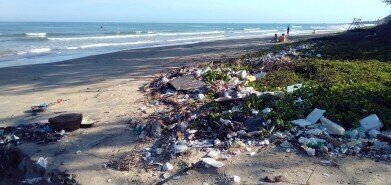Business News
Why Is Britain Facing a Littering Epidemic?
Jul 22 2020
Park wardens across England are experiencing hundreds of tonnes of additional waste in the country’s green spaces, most of which is comprised of single-use plastics. As Britain begins to emerge from three months of quarantine and lockdown measures are eased, more and more people are taking to parks, beaches and other areas of natural beauty to eat, drink and socialise with others.
But while that may be good for their mood and their mental health, the environmental implications are not so positive. Due to poor littering habits, nature hotspots around the nation are being inundated with mountains of refuse, disfiguring their beauty, threatening the ecosystems which depend upon them for survival and contributing to the dangerous problem of plastic pollution. And that’s before the effect on those poor souls tasked with cleaning up the rubbish is taken into account, either.
An avalanche of trash
Park managers, wardens and rangers from across the country have reported finding a significant increase in the amount of refuse being left behind by thoughtless people making the most of the summer weather by visiting green spaces and coastal areas. At Bournemouth beach, for example, officials have spoken of having to clear up a massive 50 tonnes of litter in just one single day. For context, an average day in June normally sees around 5 tonnes of waste collected on the town’s beaches.
It isn’t just the seaside that has been experiencing elevated levels of garbage, either. In Salford near Manchester, council employees said they had been forced to remove 200 tonnes more rubbish from the city’s parks and pathways between March 23rd and June 21st than they did in the same period last year. That’s especially remarkable, given that the city was subject to strict quarantine measures for much of that period.
Chris Worman, who manages Rugby borough council parks in Warwickshire, said that it showed a basic lack of respect from the public. “We are key workers. We have worked throughout the pandemic and now they are suffering this,” he remarked. “The people coming to the parks don’t seem to care about the environment, or the staff that have worked all the way through this. It is bizarre and frustrating behaviour.”
Single-use plastics a primary culprit
The coronavirus pandemic has come at an inopportune time with regard to the fight against single-use plastics, which was just beginning to gain traction with the mainstream media and those in power. The EU has introduced legislation aimed at phasing out the use of disposable items like plastic straws, cutlery and drinks stirrers, while the UK was focusing its effort on maximising recycling rates with bottle return schemes.
However, the COVID-19 crisis has prompted the government to delay the implementation of the deposit return scheme indefinitely. A piece of legislation which would oblige drinks manufacturers to use at least 30% of recycled material in the creation of their bottles has also been shelved, as the country attempts to mitigate the fiscal damage that the virus has inflicted on the economy.
While there may be some logic behind that decision, the planet cannot afford to wait for the British stock exchange to bounce back. In fact, the millions of face masks, gloves and other personal protective equipment (PPE) – most of which are single-use – are only going to add to the issue, threatening to undo all of the progress that has been made to date.
Digital Edition
IET 34.2 March 2024
April 2024
Gas Detection - Biogas batch fermentation system for laboratory use with automatic gas analysis in real time Water/Wastewater - Upcycling sensors for sustainable nature management - Prist...
View all digital editions
Events
Apr 30 2024 Melbourne, Australia
Apr 30 2024 Birmingham, UK
May 03 2024 Seoul, South Korea
May 05 2024 Seville, Spain
May 06 2024 Minneapolis, MN, USA



















